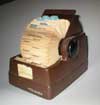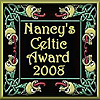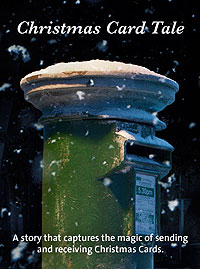| |

Traditions, folklore, history and more. If it's Irish, it's here. Or will be!
"People will not look forward to posterity who never look backward to their ancestors."
-Edmund Burke




Quotes
Library: Books, Movies, Music
Prints & Photos
Poetry
Jokes


Shops Ireland
Bunús na Gaeilge
(Basic Irish)
Circle of Prayer
Blessings
Did You Know?
Himself/Herself
Write to Us
Readers Write..
Links/Link to Us
Advertise with us
Awards & Testimonials
Submissions Guide


|
|
|
 A Christmas Card Tale A Christmas Card Tale
by Sebastian Barry
My great aunt Annie Dunne spent the last few years of her life in a nursing home, on Longford Place in Monkstown. It was just beside where we lived, on Longford Terrace. It was literally a stones throw. She was a precious person for me, I had known her as a little boy in the townland of Kelsha, near Kiltegan in Wicklow, where she had shared the little subsistence farm of her cousin Sara Cullen. My sister Siuban and I had been sent down there for a whole summer, lengthening into autumn, while our parents tried to set themselves up in London.
For a few months, those long months of childhood, she had been mother to us, herself a most wonderful woman who had never married because of the fact that her back was slightly bowed from polio. Then when we were sent on to London after our parents, we didn’t see Aunty Anne as we called her for about four years. I often thought of her in her polka-dotted dress, making her unsalted butter in the dairy, taking the sour milk to the bread bowl, petting and spoiling her favourite laying hen, and also, on one interesting occasion, wring the neck of a hen and plucking it with extravagant gestures for the pot. A whole world, that stayed in my imagination as a little boy in a very different London.
What kept her especially vivid and aching in my mind were the parcels at Christmas that she would send us, always with the same joke, something small wrapped forty times and more in layers of paper And at Christmas, one of those simple, plain Christmas cards of the early sixties in Ireland, a manger, a star, and inside her beautiful idiosyncratic writing, learned from the Loreto nuns in a Dublin childhood, as distinctive and expert as her knitting, though more rarely attempted. These cards were like objects working a sympathetic magic, the very sight of them would flood my heart with images of her world. I could, in my mind, walk around her yard, with the calves in the breathing dark of the byre, Billie the pony in the world’s simplest stable, the old high trap heaved up in the barn against the towering hay (where her favourite hen loved to hide her eggs beyond the finding of anyone).
I couldn’t read or write very well, and it was only when I got back to Ireland, when I was about nine, that I was confident enough to write back to her. I had been ashamed of my ill-formed writing till then. By which time -- she in Longford Place and myself in Longford Terrace -- we were neighbours, and I could go and see her as often as I liked, hurrying up the stairs to her room with the coal fire and the brass fender, and the clothes as few as a monk’s...
But every Christmas I would go up to Hewitt’s shop in Monkstown village and choose a card for her, write it as carefully and as clearly as I could, ask my grandfather for a stamp, and post it. Then no doubt the postman would come unseen to the postbox, which was not far from both our houses. He would carry it all the way to the post-office in Dunleary, get it franked and fussed over, and finally bring it back to her, in her niche only yards from the postbox.
Because it was essential to post it. No power on earth could have persuaded me otherwise. I knew the magic of stamps and envelopes because my grandfather on his travels throughout the world used to send me letters just for the excitement of the stamps and the postmarks. I would imagine her finding the envelope, maybe recognising the writing, and I also would imagine, rightly or wrongly, her delight, which of course I assumed would equal my own, and the secrecy of that delight. In fact, she never mentioned the cards, and always sent her own in the same unremarked courtesy and silence. It was a wordless compact.
When she died she left almost no possessions. Perhaps she had thrown most things away, as being no use to her. There were a few books from her father’s world that she had maybe never read. There was a copy of The Adventures of Tom Sawyer I had given her for her birthday one year, also maybe never read. In a box were various letters and papers, birth cert, pension book, her ‘archive’ that no university would be vying for, but that was in itself a set of clues leading back to her valuable self, to her Wicklow accent and her smoky cowl of white hair, to her simplicity of heart and greatness of soul.
In a little bundle, tied up with frugal country string, with a neat bow, were the five or six Christmas cards I had sent her, as if they were something worth keeping. Just writing this down, my heart beats at the same rate as it did that moment, with love for her.
ED. NOTE: This story was commissioned by An Post in celebration of sending and receiving Christmas Cards. For a profile on the author, please click Sebastian Barry
Image & Content: An Post
|
|
Fri, Sep 27, 2024
 The Galway Hooker The Galway Hooker
This unique vessel, with its distinctive curved lines and bright red sails, originated in the village of Claddagh. During the 19th century, hookers supported a significant fishing industry and also carried goods, livestock and fuel. Seán Rainey is remembered for building the last of the original boats, the Truelight, for Martin Oliver who was to become the last king of the Claddagh; as king, he was entitled to white sails on his boat. Since the mid seventies, many of the old sailing craft which were on the verge of extinction have been lovingly restored and new ones have been built. During the summer months they can be seen at festivals such a Cruinniú na mBád - the Gathering of the Boats - in Kinvara.
Click for More Culture Corner.
|
|




 The Galway Hooker
The Galway Hooker